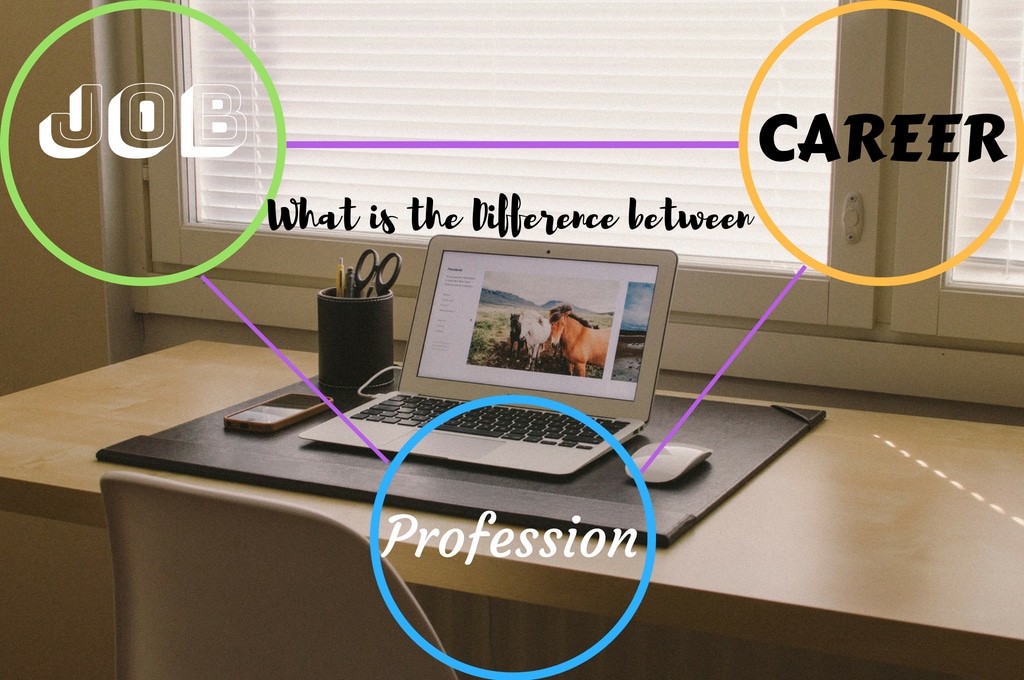I am an employment counselor. Well, you can call me a career counselor, as most of people consider me to be it!
Every day I interact with people and receive lots of emails from people asking advice about their job, career, and profession. But one thing I have noticed so far is that most of them are actually confused among these three words – ‘Job, Career, and Profession.’
This is what that made me to write this post!
 Well, let me first begin by speaking about why your job is not your career? Or, let me jot this in simple words.
Well, let me first begin by speaking about why your job is not your career? Or, let me jot this in simple words.
Why is Job Different from Career?
During your course of a career, you would be doing numerous different jobs. I hope this line makes a clear demarcation between the two.
What is a Job?
A job is a task or practice that is done to earn money. It is not your career, but yes an integral part of your career. It is because the type of job you are doing presently will be influencing your future career path.
So, when you decide on a career path, you look for different jobs within its circumference. You go to an interview, decide about the salary, and end up having the job. Hence, the tasks you are doing at that particular time is your job.
Probably, in the next 5 years, you would not be doing the current job. But will have the same career path and goal.
What is a Career?
When you do a series of connected job or employment options one after the other, then this builds up your career path. Your career is not one job, but the series of jobs.
During the course of your career, you are building up skills and moving higher to earn more bucks. At the same time, you gain skills ideal to cater the prestigious employment opportunities.
In the next few years, you would have the same career and do the same thing. But things will be different!
You will have more interesting challenges to handle, in-depth knowledge about the specific field, and better earnings to take back home.
Perhaps you can have a better understanding glancing at some differences between the two.
Difference Between Career and Job:
Dependency:
Your current job might have or might not have a relation to your future job. It can be completely unrelated to tasks you will be doing in the future.
Your career is heavily dependent on the types of jobs you are doing at the present time. Also, it is equally influential with the jobs you do in the future time.
For example, you might be a clerk earlier. After that, you completed the graduation and now opted for an executive position in a reputed organization. You see your past job does not have any relation to your current job.
But if you glance at your career chart then there is a great improvement. You have moved in an upward direction. This confirms that you are now in a better position and earning more than before.
Also, what you are doing presently will affect your future career graph!
Functionality:
Why are you doing that job? Not because you wanted to do it, but mainly to make some easy cash in your hand.
Even if you are a highly qualified person, but if you are not getting hired to a reputed company then what choice you have! You would agree to do a low – profile job.
It is because earning money is the main need of time. And this could be fulfilled only with a job.
But if I talk about your career then it is a series of such jobs. The types of jobs you do will frame your career. It is totally up to you, how you plan your career to be.
A good career is one with an upward moving graph. A bad career is one if your career graph is moving in a downward direction.
Networks:
Networks build during a job might not be long-lasting. The people you meet at a job might not relate to you in the future. They may not be the same people you meet in your next job.
But networks build during a career are lasting and reliable. Your career will offer you with numerous networking opportunities. Since most of the people would have the same career, so they will keep in touch with you now and then again.
Skills:
Getting a job does not require any planning. Rather you need a set of skills and efficiency to get the specific task done.
The skills you possess in your career are those learned and developed during the job. This can be individualized learning or any special training.
Let me clear this with an example. You were once a beautician doing the basic salon tasks. Later on, you opened your own salon. When you got your first job then you might not possess the skills needed. But you gain them over time. The skills you learned during your job have helped to shape your career. As a result, you are presently successful and earning more.
So, your job shifted from a salon worker to a salon owner. But both of them together will define your career journey.
Risks:
A job holds external risks. It is safe and stable in most of the cases in terms of earning. Although there can be shifting priorities, things get settled if you are good at your job.
Some external risks involved in a job are altering the demand, relocation, or changes in the work schedule. You can never plan the risks to take. They come from various external factors.
On the other hand, a career might not be stable. It is because it involves taking lots of risks. You may have both internal and external risks involved in your career. But you can always plan the risks to take. Also, you can prepare a backup plan to overcome the risk without experiencing much loss.
Well, I hope you have got a good idea about the difference between ‘job’ and ‘career.’ But I would like to ask you one thing. What is the difference between a career and a profession?
Like you, most of my clients have the same confusion. So, in the next section of my post, I would like to elaborate on this subject further.
Career and Profession:
You might be using the two terms interchangeably. But let me tell you that you are making a huge mistake!
Just like a job and career, there is a subtle difference between a career and a profession.
What is Career in Context of Profession?
I have already detailed about what is the basic definition of a career. This section will help you understand better about a career in the context of the profession!
A career could imply,
- Performing an occupation for a major time period of a person’s life. Such an occupation brings loads of opportunities to progress and advance.
- It is also related to the progress of the person or the achievement during his course of action through life. Your career can be in line with some undertaking or profession.
For example, she was a missionary nurse who spent much of her career in the United States.
What is a Profession?
The profession is a term derived from the Latin word ‘profiteering.’ It means declaring publicly.
The precise definition of a profession is considering it as a vocation identified with specialized training and educational knowledge. The core purpose of the profession is to offer an objective to the person.
A person performs specialized services to others, within a profession. This service can be against direct or indirect remuneration. Besides monetary gains, a person expects to achieve lasting business gains with his profession.
Hence, concisely speaking, the profession is an occupation in exchange for money that requires formal qualification as well as long training.
For example, she selected the profession of teaching. He is a painter by profession.
This does not define whether he is successful or unsuccessful in his course of work. But the profession defines the service you can offer to others. In order to become a professional, you need to possess specialized skills and traits.
Difference Between Profession and Career:
Skills:
A career may or may not involve the need for formal education or special training. It is shaped over the course of time and is followed by the overall life work of an individual.
A profession demands a person to have a set of skills. If you want to be a professional then you need to have something exclusive to you. Might be, you require formal training and qualifications to become a professional.
Field of job
Your career can involve jobs belonging to different fields and niches. Even most people have a career involving mixed jobs. Your jobs can involve different skills and services that you would be offering during your job role.
But in a profession, you are always offering one specialized service. For example, you can have a profession as a doctor, chartered accountant, engineer, and other such divisions. Under such subjects, you are offering only one specific service.
Promotions or Advancement:
You can expect advancements or promotions in your career. If you are doing better than your previous job then this means that your career is advancing.
But there is no scope for advancement in your profession. Your profession is the specific skill set that you have decided to learn and offer to others. There is no way you can expect a promotion in the profession. But yes, you can always gain experience in your professional field.
Scope of Measurement:
The profession is defined as the specific field of performing a specialized role. It is not a job that can measure in figures. For instance, you are a doctor by profession, but presently not practicing it. This will imply that you have no job or you are presently unemployed. But this will not change your profession.
Alternatively, it is possible to measure a career. If you are doing better than your past position then you have a better career. But if the case is alternate then you are not having a favorable career. Hence, you can measure the career to some extent.
Comparison Chart:
| Basis for comparision | CAREER | PROFESSION | JOB |
| Meaning | Career states a persons worklife, as in the jobs,salary,work profile,growth and development opportunities etc. | Profession refers to an activity, which is identified with specialized training and educational knowledge. It's purpose is to offer an objective to the person | A job is a task that is done to earn money and integral part of your career. |
| Based on | Ambition | Education and training | Training may or may not required |
| Occupation | Business, Profession or Employment | Profession itself is an occupation | Employment |
| Code of conduct | No such code of conduct | It has a code of conduct. | It has code of conduct |
| Orientation | Growth oriented | Service oriented | Low Growth |
Job vs. Career vs. Profession:
There is a very thin line of difference between a job, career, and profession. This I would like to explain with an example.
You are a Chartered Accountant who was working for the past 5 years with a reputed organization in Europe. But presently you have some family responsibilities. Hence, you are not rendering your service at all.
Your job was your 5 years of working where you were involved with an organization. During that course of time, you were performing a task in exchange for money.
Your profession is Chartered Accountancy. You have undertaken specialized education and training to begin your profession.
Your career was at a good pace when you were actively involved in a job. But presently you are not working, so your career can be considered stagnant. However, this will not alter your profession. As you can always begin working again as a Chartered Accountant sometime in the near future.
Tips for Job:
Your job would always demand you to perform the given task efficiently and within the desired time-frame.
Investing the desired emotional, mental, and physical energy into your job will offer you with rewarding paychecks.
Tips about Career:
You must always have a career plan. Your career plan must move in an upward direction.
Your career would involve not just to get the tasks done, but also to gain experiences, learn novel skills, develop networks, and gain knowledge.
Tips about Profession:
Your profession is the benchmark for your job and career.
Make sure you select a wise profession. This will ensure that you land a promising job and have a positive career graph.










































